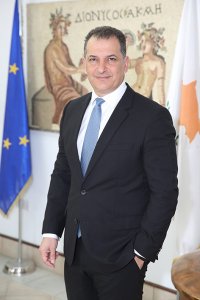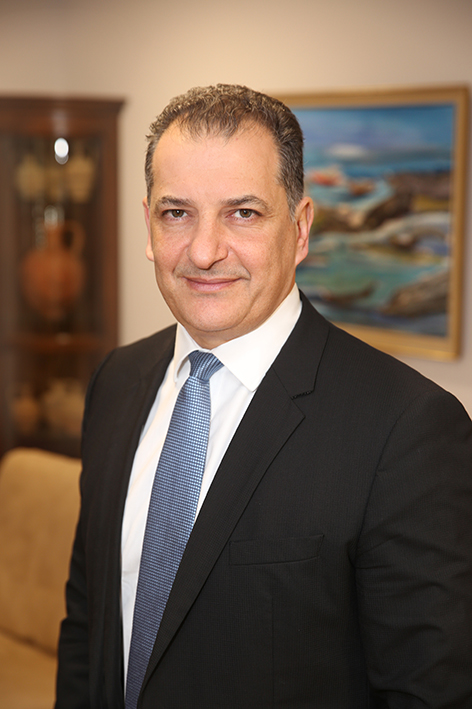Minister of Energy, Commerce and Industry – Yiorgos Lakkotrypis

How are the energy strategic plans of the Republic of Cyprus evolving?
In the context of exercising the Republic of Cyprus’ sovereign rights within its Exclusive Economic Zone (EEZ), we are continuing, in 2019, our ambitious hydrocarbons exploration programme, whereby a total of 6 wells will be drilled, including an appraisal well for the “Calypso” discovery.
In addition, we are now in the process of reviewing the application of the Total/Eni consortium for an Exploration and Production Sharing Contract for Block 7 in our EEZ. The final decision will be made by the Council of Ministers within the first half of 2019 and, if awarded, this will bring our total licensed Blocks to nine, operated by oil and gas majors with extensive expertise – ExxonMobil, Qatar Petroleum, Eni, Total, Shell, Noble Energy, Kogas and the Delek Group. Also in 2019, we expect to move forward with the plans for exploiting the “Aphrodite” natural gas field, according to which gas will be transported via a submarine pipeline to one of Egypt’s liquefaction plants, from where it will be exported to Europe and beyond, as Liquefied Natural Gas (LNG).
Of course, looking ahead, Cyprus is also currently promoting alternative export options for Cypriot gas, such as the EastMed Pipeline project. The EastMed Pipeline has, in fact, been selected by the European Commission as a Project of Common Interest and aims at transporting gas from Cyprus and the Eastern Mediterranean to Europe, via Greece and Italy.

How are the relations between Russia and Cyprus in this period in which the European Energy Map is changing?
Cyprus and Russia have always maintained excellent bilateral relations, not only at the political and economic levels, but also in terms of friendship and cultural proximity. This, for us, is evident, for example, by the fact that Russia is, to this day, our second largest tourist market, accounting for around 20% of annual visitors. 784 thousand Russians visited Cyprus in 2018 out of a total of 3.94 million tourists. Moreover, in 2017, two-way trade in goods between our two countries exceeded €195 million, whereas two-way trade in services reached an impressive €2.1 billion.
The relationship between Russia and Cyprus has been and remains strong and I am certain this will continue to be the case in the future.
The Energy Chapter has brought Greece, Cyprus, Israel and Egypt closer together, especially through the signing of trilateral agreements. France and the USA, two countries which are members of the UN Security Council, as well as Europe, as a whole, have also become actively involved. In light of these facts, could someone say that we are moving towards a new era of partnerships in the South Eastern Mediterranean, which could play an effective role in dealing with the Cyprus problem?
At the core of our energy strategy, as well as of our foreign policy in general, lies the promotion of regional collaboration and the fostering of long-lasting relations with our neighbours. We firmly believe that stability and peace in the Eastern Mediterranean can be established through cooperation in the hydrocarbons sector and, to this end, Cyprus has been spearheading, over the past few years, trilateral and multilateral partnership efforts through, among other things, energy diplomacy.
The point, after all, is the alignment of interests, of both companies and countries, while, at all times, abiding with and respecting international law. Hopefully, against such a background of regional cooperation, Turkey will take positive steps towards resolving the Cyprus problem because the rewards of such enhanced cooperation can be shared by all countries in the region.
A successful technocrat is appointed as a minister at one of the most important ministries that marks significant achievements. What is the key to your success, Mr. Minister?
Having worked in the private sector for the better part of two decades, I have tried to implement the management skills that I had acquired over the years in efficiently leading a complex ministry that is responsible for overseeing some of our economy’s most important productive sectors.
Certainly, any successes cannot be attributed to any one individual, but are the result of team effort. As such, utilising the right people, with the right skillsets, at the appropriate posts, is, for me, the number one ingredient for any achievement to be possible. From there on in, balancing short and long-term goals, prioritising the limited resources towards what truly matters and having the tenacity to withstand the relentless pressure are some of the qualities that are necessary for anyone to succeed in a business or political environment.
The economic benefits of natural gas production and business activity will be of great significance. Are you, by any chance, considering the possibility of giving part of the economic benefits as compensation to people who were affected by the policies taken in 2014, due to the economic crisis?
Undoubtedly, exploitation of Cyprus’ indigenous hydrocarbon reserves has multiple benefits for the country, including enhanced state revenues, declining unemployment, the development of know-how and attracting foreign investments. As our economy continues to improve and grow, the government is already implementing policies to alleviate the excessive financial burden suffered by some people as a result of the unprecedented crisis, including a National Solidarity Fund.
Moreover, to ensure that all citizens on the island, particularly future generations, can enjoy the benefits derived from the direct revenue from hydrocarbons exploitation, the government and the House of Representatives are, in fact, at the final stages of establishing a sovereign wealth fund to efficiently manage the proceeds from these activities.









